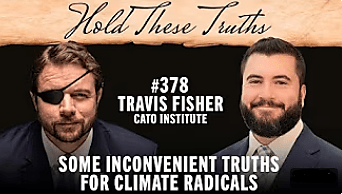I joined Congressman Dan Crenshaw on his Hold These Truths podcast to talk about climate policy, energy reality, and the Department of Energy climate report I helped coordinate under Secretary Chris Wright.
I pointed out how climate science—especially in the Intergovernmental Panel on Climate Change’s technical chapters—is full of uncertainties and caveats, while the summaries and headlines strip out all nuance. For example, climate sensitivity estimates still span a wide range after decades of modeling. At the same time, we absolutely should acknowledge that human activity has climate impacts.
We also discussed the realities that most people never hear about, such as the dramatic decline in climate-related deaths due to energy abundance and adaptation. Reliable energy saves lives.
From there, we dug into the legal keystone that supports the set of federal regulations on CO₂: the 2009 endangerment finding. I walked through how Massachusetts v. EPA pushed the agency to treat CO₂ as a pollutant, which opened the door to economy-wide regulation. With Chevron gone and the Major Questions Doctrine in place, I argued the legal landscape presents an opportunity to revisit Mass v. EPA.
We also discussed how the growing demand has shattered the old assumption that efficiency could reduce electricity use and how Biden-era rules were a de facto ban on power plants just when we needed more of them.
We ended on a potential area for bipartisan agreement: permitting. If we want abundant, reliable energy at the least cost, we have to let entrepreneurs build.
The conversation boiled down to this: climate change is real, but climate policies involve trade-offs. We should remember what makes us prosperous and resilient to climate change today: freedom, innovation, human ingenuity, and energy abundance.












